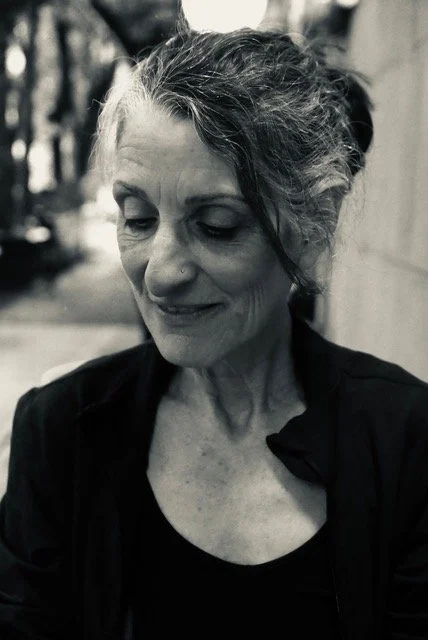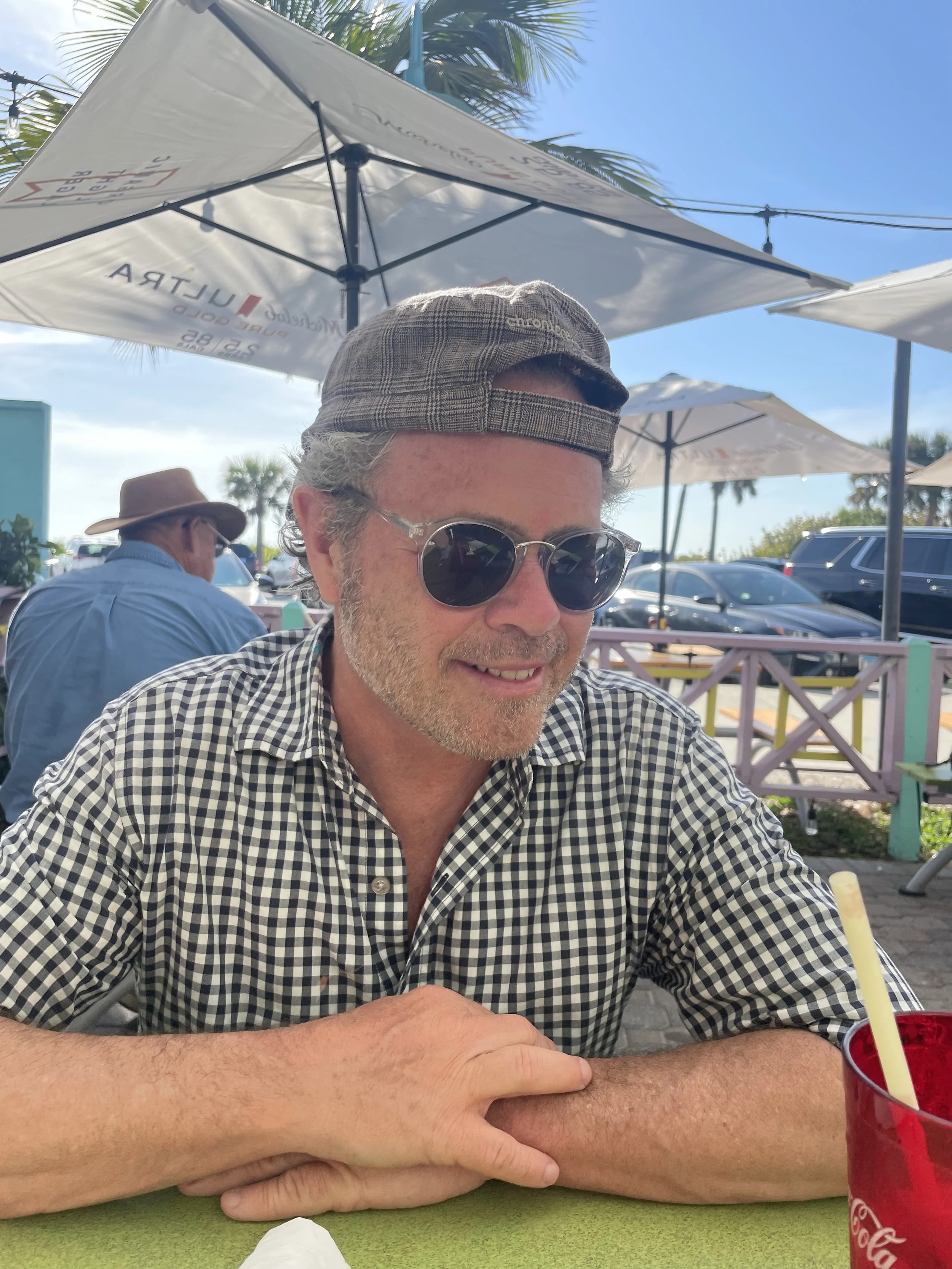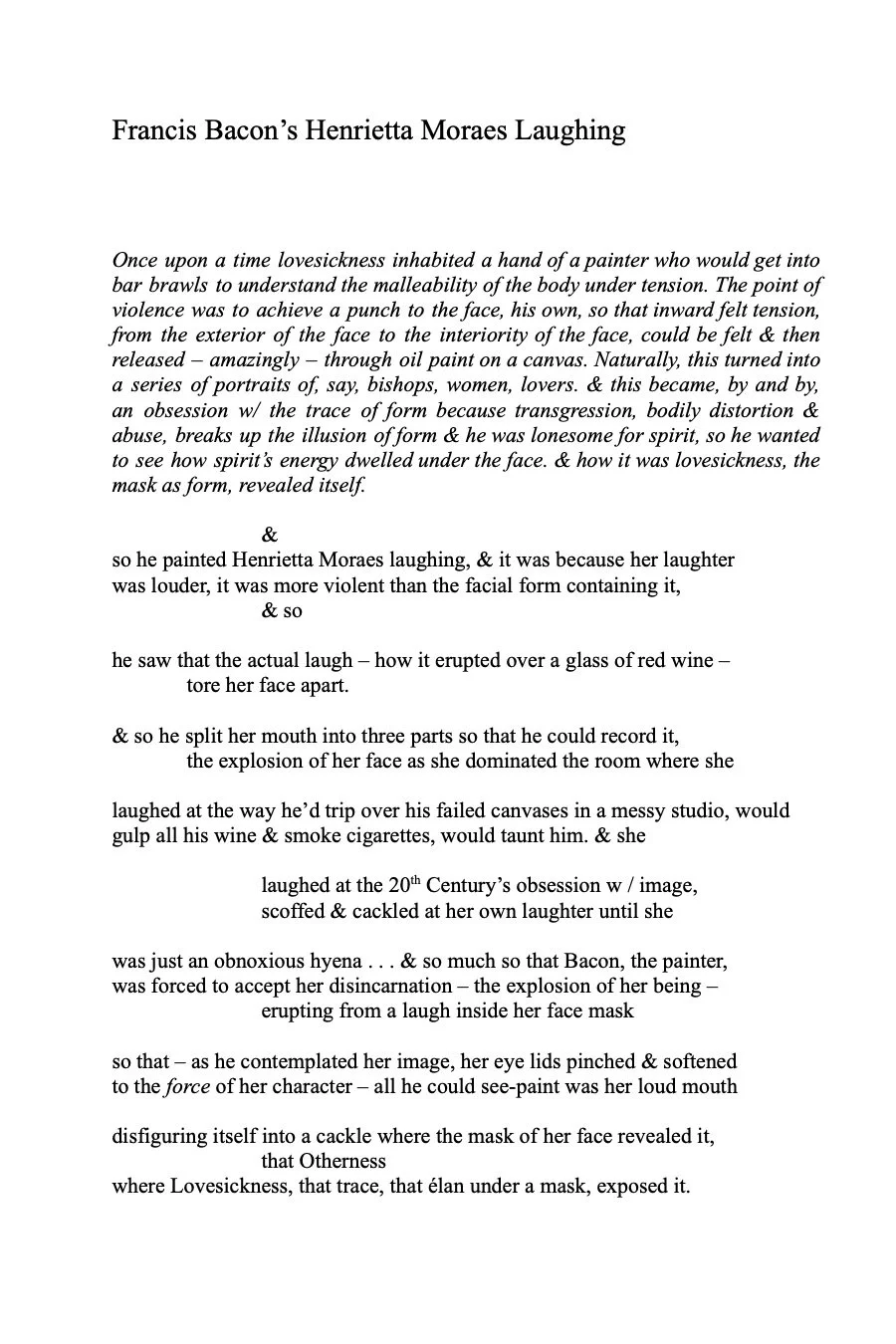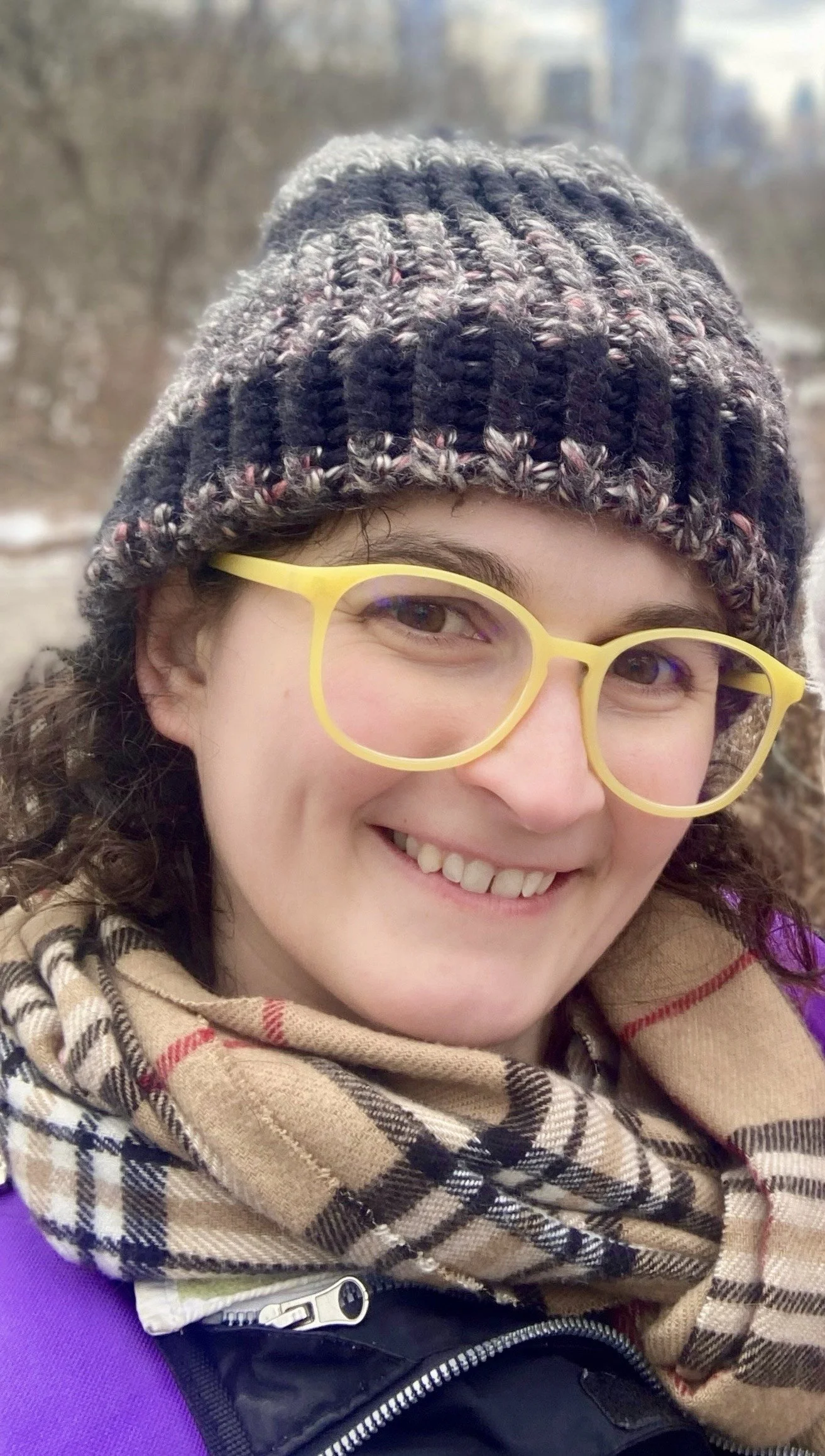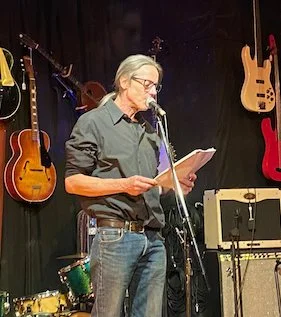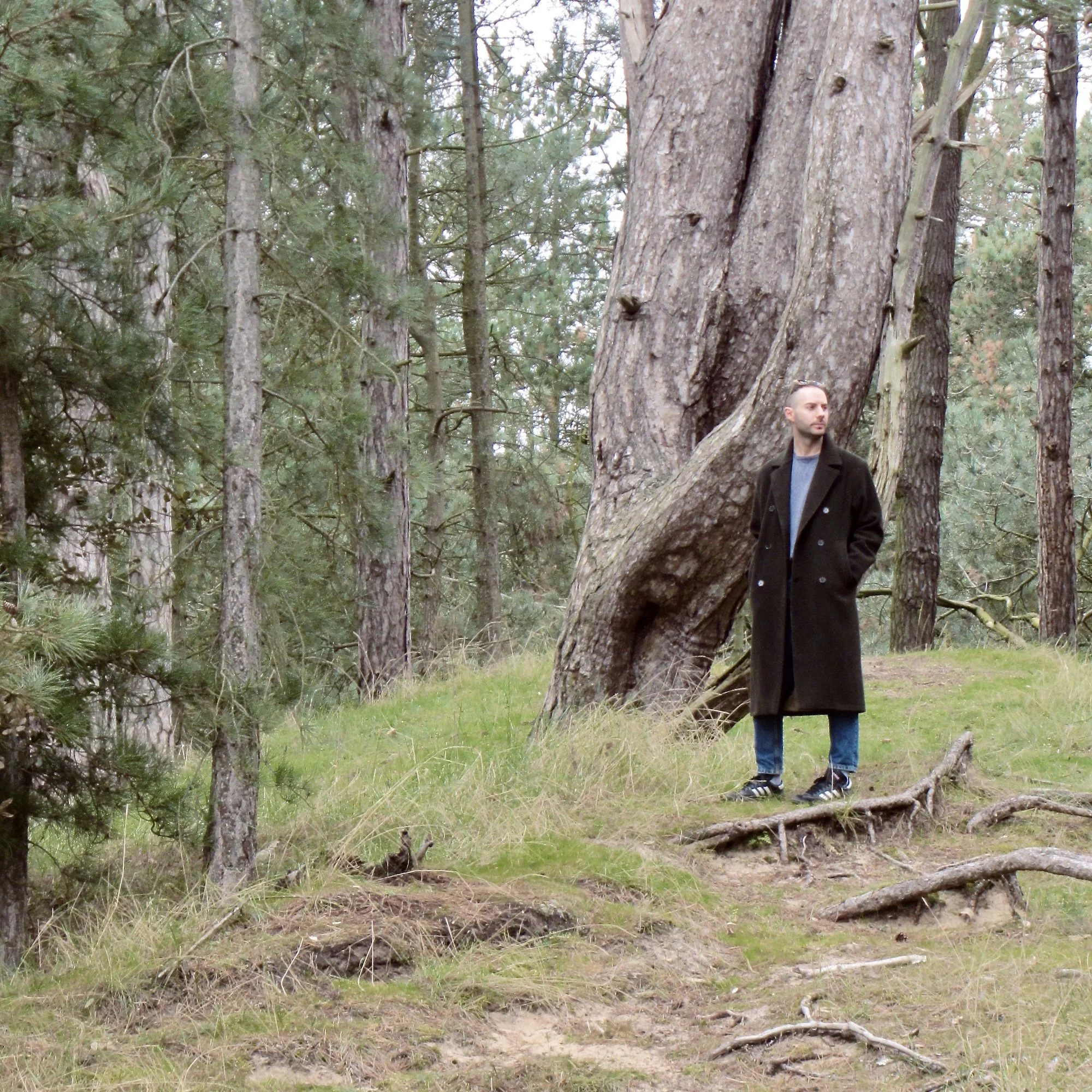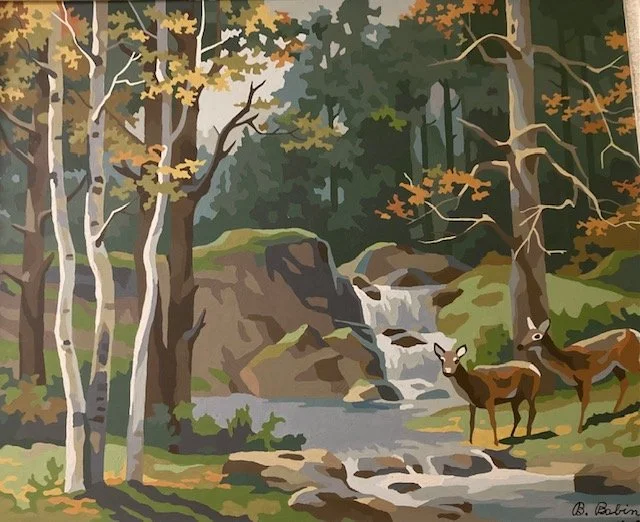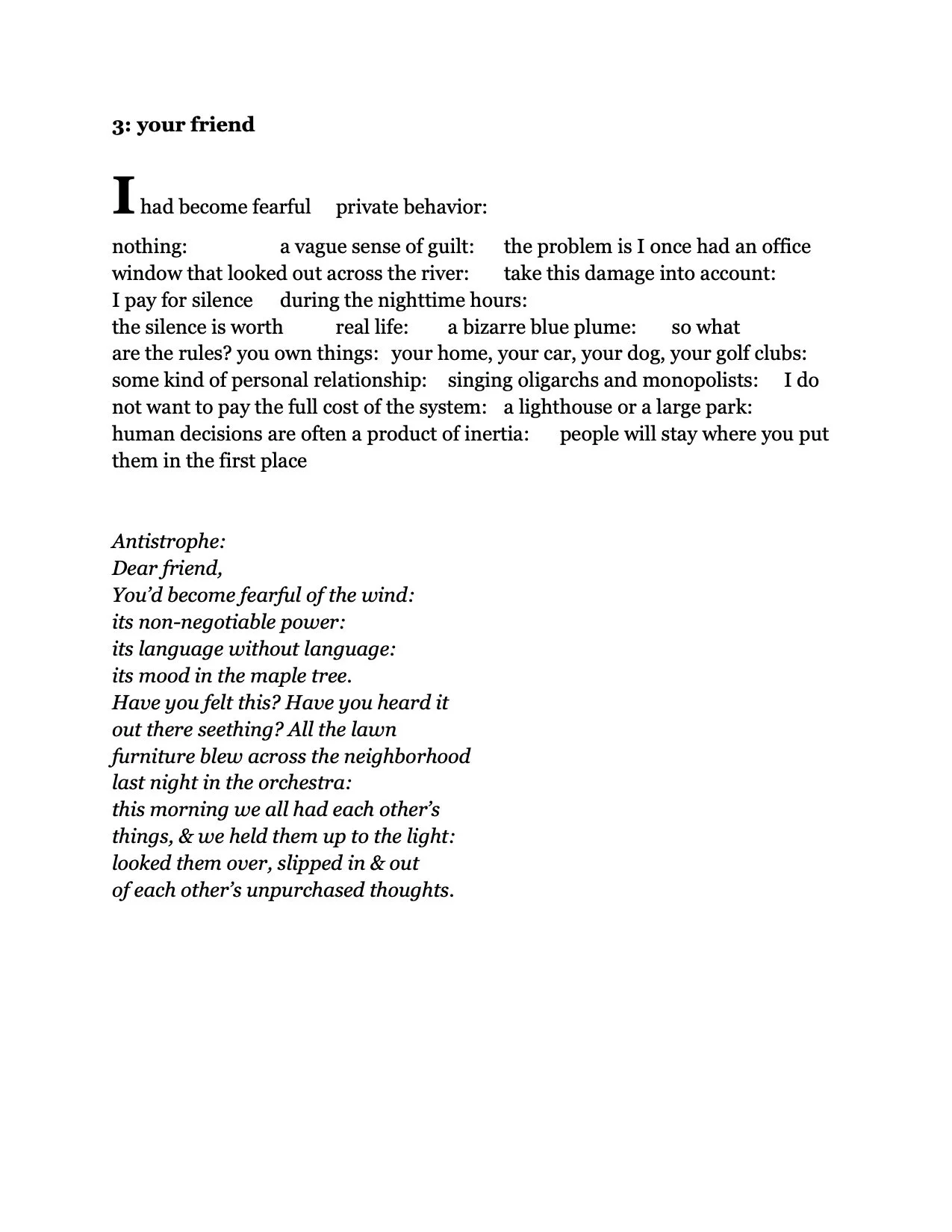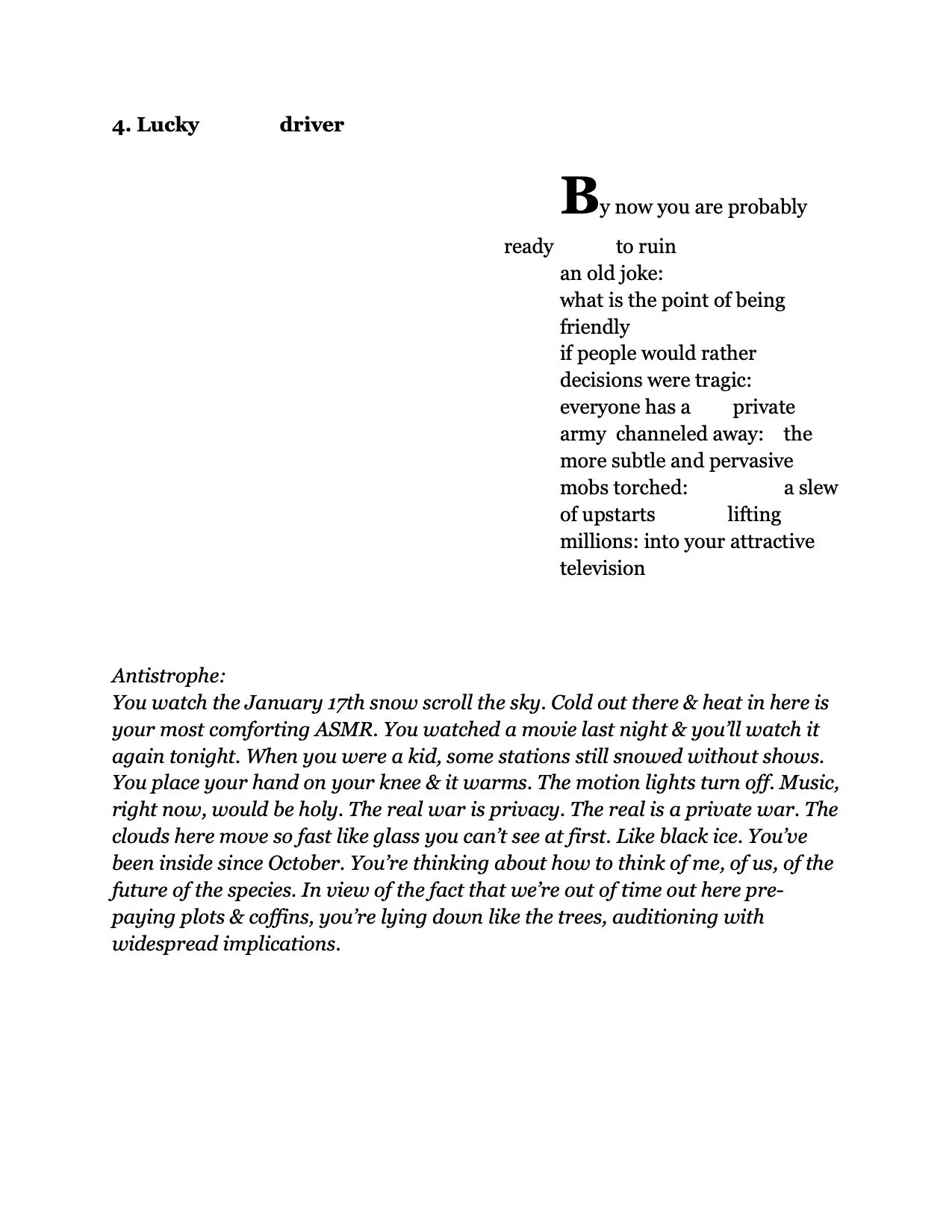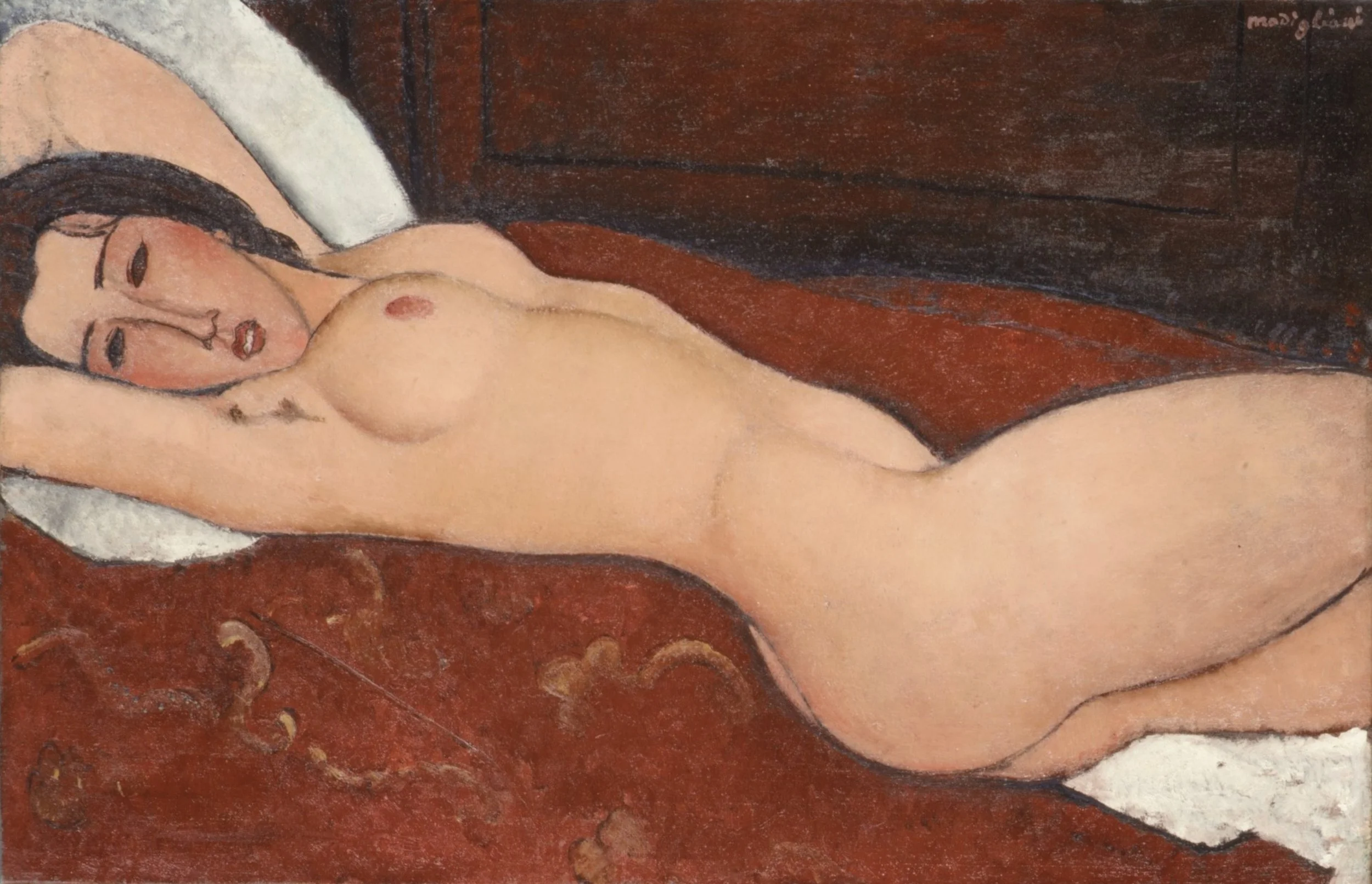Issue #29.1 Three Poems by Lynn Glicklich Cohen
After Their Fight
Politeness screams from his bouquet of daffodils, buds that look dead in their brown spathes, stems bound by rubbers bands.
They’ll bloom in a couple days, he says. She leaves them on the counter, continues to perform their ritual of getting over it. She brings him a bowl of stew with white beans and barley, napkin and a spoon.
Too much cayenne gives him a coughing fit. She thinks of the woman who watched her husband die choking exactly this way. She thumps him hard on the back.
Water he says, dabs his eyes.
She hurries to the sink to fill a glass. Too late, he reaches to squeeze her hand.
No, he says, for the flowers.
Lightning, Hail
Last night’s storm split my favorite birch in half, straight through her crotch and left
one leggy bough on the ground, her green buds severed from their source, already thirsting.
Where she stood there is now a void—a swath of blue-white sky and my neighbor’s beat up
red Bronco. Mostly there is a terrible gap, space I didn’t know I didn’t want.
The surviving half of her is, I must imagine, in shock. Lopsided, she looks like she could
collapse. Her splintered insides are raw, exposed. There ought to be blood.
I think about the dangerous boys I gave my body to, wanting to be cool and beautiful, loved. But behind
my back, girls called me a slut. That is some self-respect I’ll never get back. Crews with saws
and pulpers clean and haul. I will mourn my tree, but soon it will be like it never existed.
Ensemble
Clearing out closets, I discovered my bass part for the Trout Quintet, margins full of your penciled markings, a dare to make me laugh. Our eyes met for a blip before the violinist— what was his name?— cued the downbeat for your ecstatic arpeggiated opening, plunging us into the stream.
I heard you live on an island where orcas breach, a ferry required to arrive and depart, You never visited, didn’t want to deal with “America.” It shamed me, my life in a mid-sized city, a walk away from Whole Foods, two movie theaters, a hospital.
Sirens go by through the night. I’ve learned to listen to the slow upward glissando, the downward portamento, repeated with crescendo to triple forte until I have to plug my ears for the climax, cymbals crash, brass at full intensity. The Rachmaninoffs of rescue. I think about the day an ambulance will come wailing my way, about the coda and finale you will never hear.
________________________________________________________________________________________
Lynn Glicklich Cohen is a poet from Milwaukee, WI. Her poems have been published in numerous journals. She loves cold weather, late autumn darkness, deep conversation, tart apples, a clean lap pool, and wrangling a poem in progress. She is grateful to Trampoline for supporting her work.
________________________________________________________________________________________
Issue #29.2 A Triple Issue Ace Boggess, Ron Riekki, Nicholas Pagano
A Poem by Ace Boggess
Some Days I Want Nothing More
I exist in nothingness of the moment, computer on my lap, letting it play any of five thousand songs at random, five thousand moods from rage to lust, the universe boiled down to code deciding what I experience next. There’s a lot going on outside: wars, business deals, & surgeries. I choose none of it for as long as the space of an afternoon can hold. I used to do drugs to teach my body calm. Before that, there was music, & in the future, music. What about the absence of people? you ask. When needed, that can be a sort of poetry.
________________________________________________________________________________________
Ace Boggess is author of six books of poetry, most recently Escape Envy. His writing has appeared in Indiana Review, Michigan Quarterly Review, Notre Dame Review, Hanging Loose, and other journals. An ex-con, he lives in Charleston, West Virginia, where he writes, watches Criterion films, and tries to stay out of trouble. His forthcoming books include poetry collections, My Pandemic / Gratitude List from Mōtus Audāx Press and Tell Us How to Live from Fernwood Press, and his first short-story collection, Always One Mistake, from Running Wild Press.
________________________________________________________________________________________
A Poem by Ron Riekki
During Desert Storm, I remember seeing these officers running
with blowup dolls. It was after midnight. I had insomnia. We were doing bombings every hour-and-a-half. And these officers in dress white uniforms howling and running with blowup dolls the color of fright and they disappeared towards the shore and everywhere was towards the shore because it was a small island hidden in the middle of somewhere and I thought of what it’s like when the responsible ones are irresponsible when the women are vinyllatexsilicone and the men are wolveswolveswolves and the hooting faded, Doppler, and I would work a thirteen-hour shift tomorrow, because every shift was unlucky, and we were children, us, teens, and only two of us would commit suicide, only two, just two, and their deaths would not count in the death toll for the war. But I remember the woman’s face, a CPR-agonal-gasping face, her stiff oxygen-pumped-full body supine and, yes, her eyes begging the fullest moon and I was up above hovering on the barracks balcony looking down and they didn’t see me but she did
and she was terrified
and so was I.
________________________________________________________________________________________
Ron Riekki has been awarded a 2014 Michigan Notable Book, 2015 The Best Small Fictions, 2016 Shenandoah Fiction Prize, 2016 IPPY Award, 2019 Red Rock Film Fest Award, 2019 Best of the Net finalist, 2019 Très Court International Film Festival Audience Award and Grand Prix, 2020 Dracula Film Festival Vladutz Trophy, 2020 Rhysling Anthology inclusion, and 2022 Pushcart Prize. Right now, Riekki's listening to Portishead's "Glory Box."
________________________________________________________________________________________
A Poem by Nicholas Pagano
Plot
The yard had no fence, because it had no need.
A family of deer passed daily against the tree line. I picked
what I hoped to save before the next freeze
—Wild Rose, Impatiens, Cape Marguerite Daisies
the color of a bruise—blue vestibule before something
like finality. There were no vases that weren’t cracked along the rim;
designs in the glass, like starshine. The difference between being
trapped and held was an essential condition, something that couldn’t be
bargained for, or made to drink the water you place it in.
Knowing this almost makes it enough. The sun receded
into tenderness, a sky like steel. A line of petals cut the table where they fell.
________________________________________________________________________________________
Nicholas Pagano has previously been published in Lucky Jefferson, Mid-Atlantic Review, Stone Circle Review, Chronogram, and elsewhere. He lives and writes in New York.
________________________________________________________________________________________
Issue #29.3 A Triple Issue Jason Ryberg, Guy Zimmerman, Ken Meisel
A Poem by Jason Ryberg
{Quote / Unquote}
I’m just never sure where mist ends and fog begins,
unless it all comes down to a matter of translucency versus opacity,
in which case it’s mostly a matter of degree, I guess, meaning, logistically, at least – how deep and long one could get lost in it were they to wander off the main roads in- to its heavier pockets where people have said to have {quote} heard and even seen strange things {unquote}.
________________________________________________________________________________________
Jason Ryberg is the author of twenty-two books of poetry, six screenplays, a few short stories, a box full of folders, notebooks and scraps of paper that could one day be (loosely) construed as a novel, and countless love letters (never sent). He is currently an artist-in-residence at both The Prospero Institute of Disquieted P/o/e/t/i/c/s and the Osage Arts Community, and is an editor and designer at Spartan Books. His work has appeared in As it Ought to Be, Up the Staircase Quarterly, Thimble Literary Magazine, I-70 Review, Main Street Rag, The Arkansas Review and various other journals and anthologies. His latest collection of poems is “Bullet Holes in the Mailbox (Cigarette Burns in the Sheets) (Back of the Class Press, 2024)).” He lives part-time in Kansas City, MO with a rooster named Little Red and a Billy-goat named Giuseppe, and part-time somewhere in the Ozarks, near the Gasconade River, where there are also many strange and wonderful woodland critters.
________________________________________________________________________________________
A Poem by Guy Zimmerman
BANGING
My teeth hurt. I can’t concentrate. Someone’s always banging in the dark. Outside, it’s freezing. I’m killing myself with these cigarettes. I am the aftermath of an explosion. This is me not adding up.
But I still find ways to speak about kings, about birds and galaxies. Images hang in the air. There is prosperity, good works in the world. Love and kindness tip the balance and whenever I hurt someone, I fill up and choke on regret.
I must be honest with myself about delusion, self-flattery. This big mind so prone to error, this small, malleable heart, and how late in the game I am trying to wake up from this childlike malevolence.
My heart begins to open, a cloud passes over the sun, my mind reels back. The moment passes. I’m off again, running.
________________________________________________________________________________________
Guy Zimmerman is a playwright and director and the author of Mammal 1, a collection of poetry published by Slow Lightning Press. In addition to many plays and theater pieces, he has published widely as a theater scholar with a focus on Beckett, Pinter, Shepard and the Padua playwrights. He served as artistic director of Padua Playwrights for two decades, and now teaches at UC San Diego and writes fiction.
________________________________________________________________________________________
A Poem by Ken Meisel
________________________________________________________________________________________
Ken Meisel is a poet and psychotherapist, a 2012 Kresge Arts Literary Fellow, a Pushcart Prize nominee and the author of eight books of poetry. His most recent books are: Our Common Souls: New & Selected Poems of Detroit (Blue Horse Press: 2020) and Mortal Lullabies (FutureCycle Press: 2018). His new book, Studies Inside the Consent of a Distance, was published in 2022 by Kelsay Books. Meisel has recent work in Concho River Review, I-70 Review, Sheila-Na-Gig, Crab Creek Review and Trampoline.
________________________________________________________________________________________
Issue #29.4 Four Poems by Benjamin Myers
Blind Willie Johnson’s “Dark Was the Night, Cold Was the Ground” Travels through Space at 38,000 Miles per Hour
A low Gethsemane howl etched in gold and flung at fifty times the speed of sound aboard Voyager 1 has now outrun its drifting iterations barked from horns of parlor phonographs from Memphis down to New Orleans, the voice a barren tree flocked full of winter birds, the probe a switch- blade knife to slice the thick of outer space.
To demonstrate the things we seem always almost in danger of forgetting—what my eighth-grade English teacher always called the human condition—along with Bach, the purr of furrowed surf, and fifty tongues of greeting, science sent this song and launched it while my father lived his body long ago and I was small beside him. Let the record show groanings too deep for words, and let it show the way down cold, bare earth we bed some nights and still and still get up.
Human Remains at Ribemont
Digging trenches for the Somme, they turned us up like stones from plows, brushing dirt from our unfleshed brows to marvel in pre-battle calm.
The conquered dead will never speak, headless as here they are. And we, the victors’ bones, are equally dead. Our lone voices are too weak
to carry on the smoke-sieged air. But piled up we start to rattle, clicking low talk of sawing battle, until our voice is everywhere.
And you’ll want soon not to have known the things we say, to let us rest above our fathers’ bones unblessed, beneath our children’s bones.
Alexandria
The bright bay glitters like a bed of coins beside the citadel atop the lighthouse ruins.
Beshawled and stooped, an aged woman dips her long pole toward the glaring sea before she drops
her line into the sharply sparkling blue. The languid surf limps in and falls but barely moves
the bobber on her line. All is so still you’d think nothing had ever moved. The smallest swell
of ocean stirs the tiny weeds. She waits beside the mutely glaring sea. Small tethered boats
nod their painted heads as if at war with sleep, slowly and more slowly over the knife-bright deep.
The Skating Party
The concrete floor was blue, the paint so chipped the rink looked like a map, a flattened world we rolled across on metal wheels. In ripped jeans and in dayglo shirts the skaters whirled around the rink like streams of neon paint swirling around a drain. From one dark wall a line of hunkered games blinked lightning faint and digital. We waited for the lights to fall, the disco ball to drop its glowing snow onto our shoulders and our feathered hair, the music from the speakers to get slow and soft, a tingling in the frigid air. Then, hand in sweaty hand, we stepped, half grown, onto that ragged map, that world unknown.
________________________________________________________________________________________
Benjamin Myers is the Crouch-Matthis Professor of Literature and the director of the Great Books Honors Program at Oklahoma Baptist University. A former poet laureate of Oklahoma, he is the author of four books of poetry. His poems, essays, and stories have appeared in many journals and magazines, including Image, The Yale Review, First Things, Rattle, and The South Carolina Review. He is a contributing editor for Front Porch Republic and lives in Chandler, OK. His most recent book of poems is The Family Book of Martyrs (2023), and his second book of nonfiction, Ambiguity and Belonging, was recently published by Belle Point Press.
________________________________________________________________________________________
Issue #29.5 A Triple Issue: Sharisa Aidukaitis, Jon Provens, Mykyta Ryzhykh
A Poem by Sharisa Aidukaitis
balm
I saw someone today who looked like you; at the store right next to the chocolate keto clusters you would have mocked but gleefully tried anyway; and the onslaught of nostalgia, seeing the not-you-human with your haircut and stately profile walk past in strangerly disinterest, swept away the levees generally so well cemented that I’ve forgotten them; and the saline essence of humanity leaked onto my cheeks there by the goldfish crackers and I instinctively felt in my pocket for the empty tube of lip balm I can’t throw away because you mailed it to me before the pneumonia
________________________________________________________________________________________
Sharisa Aidukaitis is a writer and college educator in upstate New York. Her poetry has appeared or is forthcoming in Penstricken, Waffle Fried, Moss Piglet, and Drifting Sands Haibun.
________________________________________________________________________________________
A Poem by Jon Provens
Discovering the Restoration Notice on My Childhood Church’s Door
No one is a prophet in their own land, but here I am, reminded of the tooth I found in my hands, lost to communion, not when I bit the wafer, but later, in my kitchen, stuck in the bread of a sandwich that was meant for a guest. I’ve walked the 4-block stretch from the market to the Papa John’s marked with the bullet hole from the stray shot that did not kill the man who had nothing to do with the robbery. Louise said we only see things once and the rest is memory, which is probably why I won’t realize this one’s a second hole from when nine years later the bits of plastic in the folds of everyone’s brains led some to rob the same place again until I get home. One always returns home where the jacarandas grow, home where vans and masked men proffer you someplace else to go. How strange to arrive anywhere. Somehow, I always find myself lost, dusting unfamiliar stones for footprints gone awry. There is no guide. Unsearched for and unrecognized, I’ve forgotten who I will become. I’m hardly sensible. It’s been eleven years of mortal sin and festered sores before I finally cross the street toward my Church’s doors. When I reach out they’re closed.
________________________________________________________________________________________
Jon Provens is an Argentine-American writer and educator currently based in Southern California.
________________________________________________________________________________________
A Poem by Mykyta Ryzhykh
Water
What does a running river choose? To running away forever dissolve. How to kill the blood inside the meat mechanism? No one knows except the screaming stone. Empty birds fly in like paper and bring on their wings the air of the coming minutes; this is life. I walk and breathe like a fish or a flower. And the garden around me continues to move too. And the uprooted garden also continues to move. Glass reflects glass. The pigeon eats the pigeon. The first corpses grow from under the snow. Houses are falling apart like adverbs. However, the river inside me continues to dissolve death because the flow of liquid is the real alchemical time. The hands are like scarabs of the minutes on the clock, strained. My river crumbles like a desert.
________________________________________________________________________________________
Mykyta Ryzhykh, an author from Ukraine, now lives in Tromsø, Norway. He was nominated for a Pushcart Prize in 2023 and 2024. He’s published in many literary magazines іn Ukrainian and English: Tipton Poetry Journal, Stone Poetry Journal, Neologism Poetry Journal, Shot Glass Journal, QLRS, The Crank, Chronogram, The Antonym, Monterey Poetry Review, Five Fleas Itchy Poetry and many others.
________________________________________________________________________________________
Issue #29.6 A Triple Issue: Alexandra Burack, Aaron Poochigian, Jax NTP
A Poem by Alexandra Burack
Garage Trash: An Argument to Restore the Matriarchy
--response to Koertge’s “What She Wanted”
What he stole were my neurons, though I’d given freely the rack of bone that kept my heart encased, and then the sinews of that muscle itself in blue mid-pulse.
In his musty garage, my astigmatic eyes squint from a plastic box, boltless and unlabeled like lone screws and nuts in junk drawers.
Jumbled in glass jars, every petrified word from my mouth (masking tape labels repeating “Always the Wrong Word”), now flinted display fossils, lips pouting deference in place of the wail my ear still hears, nautilus side up, under the car.
________________________________________________________________________________________
Alexandra Burack’s recent poems appear in Metphrastics, ucity review, The Missing Slate, Bulb Culture Collective, and The Sewanee Review, among other venues. She serves as a Poetry Editor for Iron Oak Editions, and a Poetry Reader for The Los Angeles Review, The Adroit Journal, Poetry is Currency, and West Trade Review. She enjoyed a 45-year career as a college creative writing professor, and currently works as a freelance editor, writing coach, and tutor.
________________________________________________________________________________________
A Poem by Aaron Poochigian
Death and the Elephant
Oh no, sweet girl, the careful dirt accruing over that gray cadaver proves intent. Your trunk and toenails know what they are doing: hiding a body with a monument
because you can’t stand what’s no longer there. I hear you, priestess, on your saxophone communing with the god of it’s not fair. What went and taught you why to hit that tone?
What up and wrecked you on the grown-up trauma? It’s bad to know the absence in that hide will take them all. This world is broken, mama. You’ve been a human since your baby died.
________________________________________________________________________________________
Aaron Poochigian earned a PhD in Classics from the University of Minnesota and an MFA in Poetry from Columbia University. His latest poetry collection, American Divine, the winner of the Richard Wilbur Award, came out in 2021. He has published numerous translations with Penguin Classics and W.W. Norton. His work has appeared in such publications as Best American Poetry, The Paris Review and POETRY.
________________________________________________________________________________________
A Poem by Jax NTP
use heavy bottom pans to cook with residual heat
pixelated neon tangerine streetlights quiver dance upon your curls an afterglow of cyan passion already gone condensation
muscle memory to press ear cartilage on top of bare chest greed is knowing desire without peace or without crumbs
a trace of flame breathing beneath tendons of morning ash a tongue detects freezer burn at the speed it senses hair on food
even novels with intentional plot holes burn from loss of moisture can be salvaged by trimming raw - marvering - encalmo - latticino
desire is need without name nor tentacles nor logic nor weight nor rest nor pearls nor haunt nor jack-lining flashing color trailing
no matter what you do with eggplant it ends up being so oily a sunless warmth clinging to the fish bones of the day da capo
________________________________________________________________________________________
Jax NTP is a queer artist from California. They teach critical thinking, literature, and composition at Irvine Valley College, Golden West College, and Santa Ana College. Their words have been featured in Apogee Journal, Berkeley Poetry Review, Crab Creek Review, Hobart Pulp, Permafrost Magazine, Cordite Poetry Review (AU), Antithesis Journal (AU), Sinister Wisdom, and elsewhere. Their debut poetry collection comes out next year: in bones & tentacles: how to pivot when you're paralyzed. https://linktr.ee/JaxNTP
________________________________________________________________________________________
Issue #29.7 Four Poems by Corwin Ericson
Film History
The legend of the onrushing train and the audience of brave bumpkins that did not flinch and how they glared back and grabbed the caboose and rode to the next showing to find themselves pointing revolvers at an audience bored by their organist who escaped during the ensuing duel carrying the single reel of The Staring Match the audaciously mesmeric film that burned a crater in the screen through which children explored backstage and left the stage door ajar for the cats to slink in and mooch for snipes unsmoked by last night’s audience because they came and went when they wanted like cats looking for warm seats freeing the artists to eschew narrative devices and make work like The Opposing Snowfields with two screens and no projectors which the cats dozed through unaware that most cinemas would burn down before audiences even learned how to applaud.
Last Universal Common Ancestor
Needing bilateral symmetry shoes are parasitic dependent on their hosts to pair them up with their mates.
Bucking the trend the furniture kingdom is unique using legs not for locomotion but to reach the ground.
The illusion of Euclidian flatness allowed tarpits to attract their prey. Parking lots retain this trait belying Einsteinian curvature to lure cars.
Whereas Linnaeus held a shadow is attached umbilically to feet phylogenetic taxonomy hangs it on a branch of the darkness tree.
Consider the carapaces of salt and pepper. Nearly identical yet without any shared ancestry. The desire to be shaken leads to convergence.
Flies evolved good luck to escape hands. Hands assemble into an audience for defense. Clapping makes it hard for performers to perceive individual fingers.
Intelligence thrives on problems concussions rising to the occasions.
Lake of Tears
Boo hoo hoo— the cat cries a lake and the mouse and dog bail out their bathtubs and paddle into the sky. They mop their brows with fistfuls of cloud.
The lake plug is pulled. The duck unfurls her parasol. there’s a cactus here, a mesa there a jailhouse. This is a map that has never been folded. Above it, the bricks zip by and the sun is as round as ever.
The dog shakes off his bath and it all floods again They extend their spyglasses— somewhere there is a dry town with shade trees with rocks for pillows with a good brickyard.
A worm is lowered through the map to explain to the fish the lovelornness of cats the scratchboard nights. The worm tugs twice on the line the dog smokes a cigar, the cat wails the mouse strokes his brick.
Ill-Bricked
I built it so badly that only a few people noticed it was a house. I would squat there in the rain holding bricks over my head.
Later when I was a ghost more people noticed me than before. They were rude. They felt they could say anything to a ghost.
I came to sense I’d lost my night vision and could tell I was losing my night voice and I was deaf to darkness already.
Before I got to this state I would lie in the grass where my house would be impatient for night for ruinous dreams.
________________________________________________________________________________________
Corwin Ericson is the author of the novel Swell and the collection Checked Out OK. His work has been published in Jubilat, Harper's, Sortes, Galaxy Brain and elsewhere. This summer, to his delight, he discovered that a sentence from his novel appears as an example of usage for the word "shit" in Merriam Webster's online dictionary.
________________________________________________________________________________________
Issue #29.8 A Triple Issue Simon Ravenscroft, John Wojtowicz, Andrew Ray Williams
A Poem by Simon Ravenscroft
To want nothing more than absolute clarity
Adamantine mists blur the line of earth & sky / the horizon is all softness, a foam of light, precision gone.
No here nor there, no reference point.
Where are the seraphim to guide me?
In my headphones choirs of seeming angels sing Os justi / I breathe & stretch out in familiar fields of warm inertia, wormwood tickling at my feet.
________________________________________________________________________________________
Simon Ravenscroft is a Fellow of Magdalene College at the University of Cambridge in England. He has published poems recently in Osmosis Press, The Penn Review, Apocalypse Confidential, Full House Literary, ē·rā/tiō, RIC Journal, High Horse, Red Ogre Review, La Piccioletta Barca, and other places.
________________________________________________________________________________________
A Poem by John Wojtowicz
Toast Ghost
My mind often (and quite suddenly) takes the stairs two at a time to a study tucked somewhere in the executive suite of my prefrontal cortex.
I like to imagine there’s a Persian rug, a rack of billiard pipes; walnut bookshelves and a turquoise wingback with brass studs. Here I’ll recall
two bats I saw the other night
which will send me spiraling into the varieties of mammals. And soon I’ll be pondering platypuses while muscle memory continues with the mundane task at hand.
When I snap back to my programming, I try putting two slices of bread in the toaster but find two cold pieces of toast. I alert my family. No one claims them:
Toast Ghost.
This is not the first visit we’ve had from this phantom who’s become part of our family mythology—a Jersey Devil who will spook us even
when our Pine Barrens no longer share an address—this spirit that connects the four of us in ways that only we understand.
One day, when I’ve retired to that county library in the sky and my children have toasters in their own homes,
they’ll know I’ve come for a visit when, half-asleep in their kitchens, they go to toast two slices of (preferably) split-top wheat but find their toaster haunted:
Toast Ghost.
________________________________________________________________________________________
John Wojtowicz grew up working on his family’s azalea and rhododendron nursery and still lives in the backwoods of South Jersey. Currently, he teaches social work at Rowan College South Jersey. He has been featured on Rowan University's Writer's Roundtable on 89.7 WGLS-FM and Painted Bride Quarterly's Slush Pile Podcast. Recent publications include: Rattle, New Ohio Review, Waxing & Waning, Gigantic Sequins, and Sonora Review. His chapbook, No Lightsabers in the Kitchen, was selected as a winner of the 2025 Poetry Box Chapbook contest and is forthcoming in early 2026. Find out more at: www.johnwojtowicz.com
________________________________________________________________________________________
Two Poems by Andrew Ray Williams
Mirror at Eleven
after Vincent Van Gogh’s Self Portrait with Bandaged Ear (1889)
I was eleven when the mirror started talking.
Using familiar voices, it told me to linger—
tilt your chin, suck in.
Before too long, I wanted to carve my face,
like a Thanksgiving bird.
I know they say that Vincent was a madman
for removing his ear from the world,
but I wonder if he was just tired of listening.
He who has no ears to hear,
let him no longer hear.
Strange Laughter
This morning I awoke laughing.
Not just a chuckle,
but the kind where you wipe tears
from your temples,
where your ribs ache afterward.
But I couldn’t remember why.
Just a memory—thumbing
through a jar of multicolored buttons
at my grandparents’ house,
playing marbles with my cousins.
So I lay there, dazed,
like Sarah, long past hoping—
laughing at the promise
of a joy she thought was gone,
and somehow still arrived,
too strange to be anything but holy.
________________________________________________________________________________________
Andrew Ray Williams is a poet based in Virginia’s Shenandoah Valley. He holds a PhD from Bangor University (Wales, UK) and is the author of three poetry collections, most recently, A Weathered Ship (2025). His work appears in numerous magazines, journals, and anthologies, including Eunoia Review, Locust Shells Journal, Red Eft Review, The Lake, and tiny wren lit. Connect with him on Instagram: @arw_poetry.
________________________________________________________________________________________
Issue #29.9 Two Poems by Bill Neumire
________________________________________________________________________________________
Bill Neumire’s first poetry collection, Estrus, was a semi-finalist for the 42 Miles Press Award, and his second book, #TheNewCrusades, was a finalist for the Barrow Street Prize. His poems have appeared in Harvard Review Online, Beloit Poetry Journal, and West Branch. In addition to writing, he also served as an assistant editor for the literary magazine Verdad and as a reviewer for Vallum.
________________________________________________________________________________________
Issue #29.10 A Quadruple Issue: Garth Pavell, Charlotte Cosgrove, Michael J. Kolb, Grace Lynn
A Poem by Garth Pavell
Walkie Talkie Transience
The patience of plants makes the leaves nuts
in the way you give back in a sex dream.
It's safe to let the night flower for a bat in bed,
pumping winged blood through the sonar dark.
Early this morning I let my lizard-skinned cactus
drink fluid conversation, prompting dreams to fall
asleep with the clouds laying on the grass by
the soccer field’s goal posts. It’s too early to
cheer children’s mercurial cleats
kicking dirt onto the day’s ground
rules so we have time to talk without words.
________________________________________________________________________________________
Garth Pavell wrote “Walkie Talkie Transience” after being introduced to Dean Young’s poetry, which Garth says never strays from having fun. Additional poems by Garth Pavell can be found in the recent or upcoming issues of Broadkill Review, Epiphany, Glint Literary Journal, MacQueen’s Quinterly, Misfit Magazine, Peatsmoke Journal, and VOLT. Connect on Instagram @garth_and_the_unwieldys and YouTube @garthpavell.
________________________________________________________________________________________
A Poem by Charlotte Cosgrove
Theft
Memory is harsh. Saturday afternoon bags of shopping in the kitchen Chocolate bars flirt, expose themselves through thin plastic.
What colour was the Time Out font? Blue wrapper, six in a pack Individually wrapped and then wrapped again like bandaged legs, ready to be undone The quick actions of an unthinking junkie.
They’re under my top, meeting rolls of loose flesh Locked door, My throat - a trebuchet Throwing the unwrapped feast into myself.
Denial, denial, denial. She knows it was you. She can’t prove it. Wrapping trapped down the side of the bed That you lay on. The door remains locked.
________________________________________________________________________________________
Charlotte Cosgrove is a poet and lecturer from Liverpool. She has published two collections of poetry and is the editor of Rough Diamond poetry journal. You can find her on Twitter @CharleyAustin89 and Insta charlottecosgrovepoet.
________________________________________________________________________________________
A Poem by Michael J. Kolb
Tomorrow’s Not Promised
They never say it plain,
but I hear it,
in the doctor’s rehearsed calm,
in the nurse who studies the floor.
I check my labs before I check the sky.
I plan in fragments:
a dinner cooling half-cooked,
a book stalled mid-scene,
the bag zipped but never sealed.
Some days I pull on clean socks
like sacred cloth.
I brew coffee I may never drink,
still setting a plate I might not need.
Hope isn’t cosmic,
it lives in folding shirts,
in brushing teeth,
in the body repeating yes
while the mind whispers no.
________________________________________________________________________________________
Michael J. Kolb is Professor of Anthropology at Metropolitan State University of Denver. He writes across disciplines, exploring nature, memory, and illness, asking what we carry and what we leave behind. His manuscript What Keeps Me Looking Out the Window was a finalist for 2026 Press 53 Award. He is the author of Making Sense of Monuments (Routledge 2020). His poems appear in Third Wednesday, Sky Island Journal, Eunoia Review, Defenestration, and San Antonio Review, Speckled Trout Review, and Moss Piglet. Instagram: @michaeljkolb; substack.com/@michaeljkolb.
________________________________________________________________________________________
A Poem by Grace Lynn
Retire From Reclining
—-Inspired by Modigliani’s Reclining Nude (1917)
You must be one of Modigliani’s women of bulimic diameter. How many miles did you log today swimming compulsively in the sea? A Madonna monk of malted milkshakes, cheese burgers, bars and bad habits. Abstaining to sleek the hourglass corset of your flesh, you lounge provocatively in luminous breasts polished peaches and creams. Shining faint on your bed’s dark crimsons and forest greens, you coyly peck at cucumbers and romaine leaves. Squinting in your almond eyes at your gentlemen callers as if they are TikToks of distracting recipes. My eyes trace the curved lines of your torso, though your hands and feet fizzle like ginger ale bubbles beyond the frame. You remind me of homerooms where I practiced long division on my body, giving up Ritz crackers and cheddar for the remainder of sharp angles and spindly legs, of Vogue covers and storm-emaciated willows, laying limbless in your ballerina trunk. I want to take you to the corner bakery and sit beside you at a banquette. I will hammer, anvil and stirrup my every nerve into a hingeless ear for you speak freely of your hurt without Modigliani monitoring your manners or muting the noise on your voice, powdered sugar sticking to the white tiles of your teeth.
________________________________________________________________________________________
Grace Lynn is an emerging painter who lives with a chronic illness. Her work explores the intersections between faith, the natural world, art and the body. In her spare time, Grace enjoys listening to Bob Dylan, reading suspense novels and investigating absurd angles of art history.
________________________________________________________________________________________
Issue #29.11 Four Poems by Sunnylyn Thibodeaux
The Things We Carry
I walk seven blocks uphill with an oil-field duffel bag of dirty laundry to the nearest washeteria. Grumbling about the city’s economics and the slant towards wealth. No car. No service nearer. Economically we are near bottom. Existentially we float Spouse has been sober for thirty-five days. Highlighting a rejuvenation of spirit on this Easter Sunday. I pass the Redemption Church in full worship echo on my way up. Bought a handmade bronze piece from a local artist. Reminded me of an artichoke blossom, reminding me of my mother and her Sicilian tradition honoring St. Joseph with lilies and cookies and penance for all our sins. I pay an extra fee because I carry no cash to my father’s disapproval as he hid his status from the man. I hold the loss of them both in my throat as I string my new piece around my neck. Maybe too bold for my chemo hair. Maybe just right. He called it “Moonflower” because the moon is dead he said, but in that it offers life. On this day of resurrections with nine minutes left in the cycle I pick up a broken wisp of Pampas to bring home, Maybe make something of my own
Bearing Water
I want to tell you run for your life when you share the new comradery in verse, back float starfish, cloud identification – perfect blue, picturesque, formations shift, drift, meet others along the stream. Creeley warned of this in a different way. Play in the halls! Careful of the bonds that form, expectations of loyalty. We're in dark times silenced for disagreement or worse, love. Sharks patrol these waters, swimming or wading in the murky blue could get you noticed, could get you pulled in. Company is a beautiful thing, in the right climate— winter season, spring folly, summer skins. Page by page it is love that unfurls. Something to feed. Dagger in the opposite hand, an unknowing spouse Waters always inviting, but don’t ever turn your back on the ocean some of us lived to learn Angle of shark's teeth makes it treacherous to pull away. Clouds flatten from stacks change shape in the reflection
Isolated Showers
Sky's grey with the threat of anticipated rain. Tap overhead, wisp the five foot sour weed. Beastly charcoal movement with its moisture collection Twelve days till half century mark. Dog days they say, though I've lost track of the stars in this iteration. And I wonder what Lew Welch would say about these critters, these politics, this crisis of climate. For many years I thought I could be the one to find him in the wood since we are kindred spirits, Leos and all. Wondered if his drinking would bother me less since being so enamored by his poetry, the pain maybe making sense, the encouragement I could offer. Precipitation slaps the Blessed Mother cracked at the shins under her robe that I mistakenly tried to freshen my father's sixty-year-old detail. Mildew and bare cement cover the earth where her feet are perched. A lizard on her shelter, invasive species from some other warm place, adapted quickly. Think about planting a tree to find shadow under, watch the birds hop about trying to understand their placement as scenery changes from old to new to old again. Happy Birthday season, dear Leo Being lost is why it all started to begin with. We could read Genesis again, the serenity prayer, farmers almanac. Storm moves on. Mosquito hawks zoom across the St. Augustine grass. There's a single drop still dangling on the lily's blade, pointing downward catching light like a diamond
Mailbox Full
for Duncan McNaughton
I want to say you’re on my mind in all the hours that I cannot call. It’s 2:13 am and some weird wiring of my system woke me. My mind running through a to-do list and on that to-do list is “catch-up” with all the people that I love so that they know that I love them. I want to tell them that I’m struggling with the loss that has piled, but I don’t want to make it about me. I just want connection and to not feel regret when you go. But that is making it about me again. I’m struggling with that part. This shit sucks. Grief and all. Whatever the mess of this complication is. It isn’t cut and dry. But I wouldn’t say all that on a voicemail. I promise. I would just say that I miss you and that you are on my mind. Often. I mean I wouldn’t call often. I’d just let you know I am thinking about you often. But I would call often if you’d like. And if I had time. Time isn’t friendly when you’re trying to grieve. Or just figure shit out. It just keeps going with no regard. And there’re bills past due and a new appointment and some scheduled evening meeting I’m too tired to remember and then it’s like, oh hey when’s the last time you talked to your friend. Oh yeah, I should do that because I want them to know that I love them and because frankly this grieving shit is super lonely, but I don’t want this to be about me. So I wouldn’t ever say that. But really, I love you. That’s all I want to say, but your mailbox is full. I’ll try again. I won’t wait so long. I’ll try again soon I promise. When I get a moment to actually breathe.
________________________________________________________________________________________
Sunnylyn Thibodeaux is the author of five full length collections of poetry, as well as over a dozen small books including Witch Like Me from the Operating System. She is the mother of a Scorpio and wife of a poet and splits her time between San Francisco and New Orleans. In 2026 City Lights will publish her newest book, Lucky Charms: New and Selected Poems.
________________________________________________________________________________________
